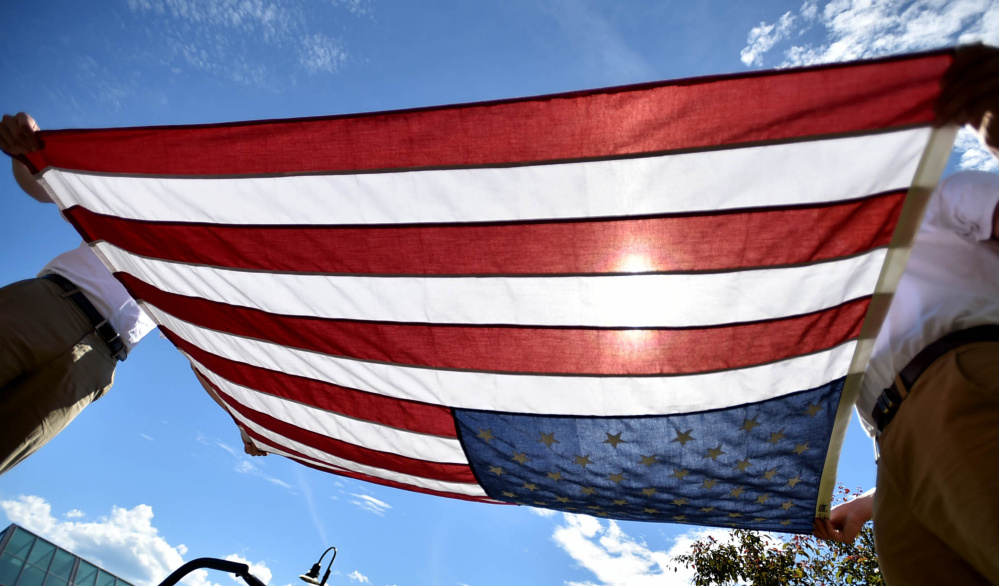Our country is so polarized by the president, political parties and hot-button issues such as transgender rights and racial profiling that we don’t even start from the same sets of facts. So it’s appropriate to ask what, if anything, binds us as a people?
The answer might surprise you, judging from results of a survey of 1,000 adults around the country, commissioned by Grinnell College in Iowa and conducted by Selzer & Co. from Nov. 24 to 27. We may have more in common than we think.
Respondents were given a list of 12 characteristics and asked to rate their importance to being a “real American.” A whopping 90 percent rated as very important a belief in treating people equally. Eighty-eight percent said it was very important to take personal responsibility for one’s actions. Eighty-one percent and 78 percent respectively rated as very important accepting people of different racial and religious backgrounds.
That sounds like a remarkable degree of accord. Even on issues that politicians of both parties have used to sow divisions, the public seems more interested in values than in status. Less than a quarter of those polled, for example, consider it very important to have been born in America or to have lived here most of one’s life. Only 23 percent give great importance to being Christian. Less than half (44 percent) consider speaking English very important.
And more than half believe America has a moral responsibility to provide asylum to people fleeing violence and persecution.
Is there disconnect here between the president’s clamor for a wall at the Mexican border and his practice of separating incoming children from parents and survey results suggesting Americans are a welcoming, compassionate people?
On some particular questions, if you break down the responses by political affiliation, there are discernible differences between Republicans and Democrats. But the composite picture still points to more open-minded attitudes toward others who are different from ourselves than the political rhetoric that has been deployed to win elections would suggest. For example, a majority (58 percent) of respondents believe that Muslims face a lot of discrimination. Clearly that view is more common among Democrats, 75 percent of whom answered yes. But even among Republicans, 44 percent shared that view, as did 57 percent of independents.
For both LGBT and African-Americans, 52 percent say they are very discriminated against, while less than a third believe there’s a lot of discrimination against women.
You might suspect some respondents actually harbor prejudices of their own toward those groups (which they may or may not act upon), which is why such a high proportion agree discrimination exists. But when asked if employers should make special accommodations to religious employees who seek a private space to pray, 47 percent said they should accommodate Muslims while 41 percent disagreed. Fewer (41 percent) said employers should accommodate Christians, while 49 percent said they shouldn’t.
Reading some of these answers, you have to wonder how Donald Trump even won election. One theory might be that he used two of what political analyst Charlie Cook calls the most potent emotions in American politics: fear and hatred, using hypothetical scenarios to get votes. But when not confronted by the threat of dire outcomes, people are more reasonable.
And how do we square the amount of bigotry and hatred spewed over social media with the poll finding that 68 percent of respondents don’t think it’s OK to express hatred that way? Could it be that much of that hateful rhetoric we see is the work of organized political forces intended to sow divisions among us?
Some lesbian friends used to joke after Iowa got same-sex marriage rights that conservative political strategist Karl Rove helped open that door. They said he put the prospect of gays marrying on the radar to scare people when no one had ever dreamed of it.
Poll respondents did express some hatreds: 32 percent said they hate a politician; 26 percent hate a political party and — ouch! — 18 percent hate a member of the press. But maybe the reason is they blame those groups (rightly or wrongly) for polarizing us. Overall, the responses suggest people are better than the way political fear-mongering might make some of us behave.
They also suggest we’re not much different in what we seek out of life: Asked if they would choose working at a job they love or making more money, 78 percent said they’d choose a job they really love, and only 19 percent opted for more money. And that cut across political lines.
Maybe the message here is people are sick of being manipulated into fearing and loathing one another. Maybe we should be more discerning of politicians who seek power by dividing us. Maybe, as poet Maya Angelou wrote, “We are more alike, my friend, than we are unalike.”
Rekha Basu is a columnist for the Des Moines Register.
©2018 Des Moines Register
Distributed by Tribune Content Agency, LLC.
Send questions/comments to the editors.



Success. Please wait for the page to reload. If the page does not reload within 5 seconds, please refresh the page.
Enter your email and password to access comments.
Hi, to comment on stories you must . This profile is in addition to your subscription and website login.
Already have a commenting profile? .
Invalid username/password.
Please check your email to confirm and complete your registration.
Only subscribers are eligible to post comments. Please subscribe or login first for digital access. Here’s why.
Use the form below to reset your password. When you've submitted your account email, we will send an email with a reset code.